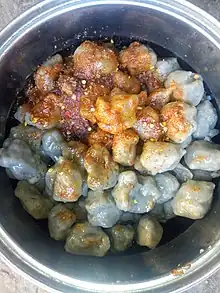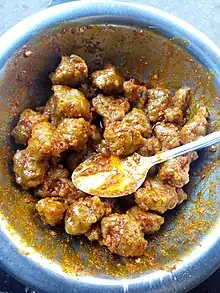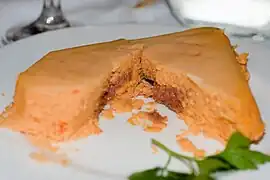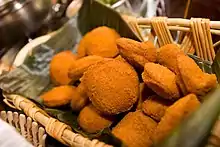Hausa cuisine
Hausa cuisines are traditional and modern food prepared by Hausa people. It is based on the availability of raw food materials they can farm or provide from other places. Most times Hausa people depend purely on the farm products they have cultivated for food preparations.[1] Hausa people have a meal that is common to most Zongo communities called Tuo Zaafi.
Breakfast
Hausa people take breakfast very seriously. They take light liquid foods for breakfast. These foods are usually prepared at home, but some Hausa people use to buy commercial food from either food houses or street food sellers. Most Hausa take the following foods as breakfast:
- Koko and kosai: This food is majority taken by at least 70% of Hausa people as breakfast, kosai is a dish which is made from a peeled beans formed into a ball and then deep-fried in palm oil,[2][3] while koko is a porridge and a traditional hausa food made from millet, maize, guinea corn and tiger nut with a small amount of additives that are added to make it nourish. Koko is of different varieties to Hausa food preparations, there are the following types of Koko:[4]
- Koko: It is made from a liquefaction liquid obtain from a grinded millet.
- Kunun tsamiya: made from a powdered millet
- Kunun gyada: made from liquefaction of Groundnut with a boiled raize added inside
- Kunun dawa: made from guinea corn
- Kunun acha: made from ache
- Kunun masara: made from maize
- Kunun aya: a drink made from a tiger nut, similar to tiger milk.[5]
- Kunun kanwa: made from millet, but entirely different from kunun tsamiya
- Waina or Masa:
- Coffee and bread: In the modern days, hausa people take coffee and bread as breakfast. It was not part of their tradition but it was adopted as a result of the British colonisation
Lunch
- Dambu
- Dan wake: these are Beans Dumplings prepared by boiling, eaten either with palm oil or groundnut oil with a fine grinded pepper
- Fate
- Taliya
- Shinkafa
- Alale in Hausa
Dinner
- Tuwo: made from flour of maize, millet or guinea corn, a thick pudding usually eaten with different kinds of soup, usually, Miyan kuka is the common soup made from a powdered dried baobab leaves that has been ground into powder, it is dark in color. Followed by Okro soup (dried and fresh soups ), taushe, miyan kubewa and others.[1][6]
- Shinkafa:
- Funkaso:
- Tuwon shinkafa:[7]
Beverages and drinks
Sobo: a natural drink made from a dry zobo flower (roselle plant)
Snacks
Hausa cuisine features a variety of snacks and desserts, including kuli-kuli, a deep-fried snack made from ground peanuts and spices, and masa, a type of rice cake that is typically served with a spicy sauce. Other popular desserts include kunun gyada, a sweetened peanut milk, and dakuwa, a sweet snack made from crushed peanuts and sugar.
Soups and Stews
Hausa cuisine is also known for its soups and stews, which are typically made with a combination of vegetables, meat, and spices. Miyan kuka, a soup made from baobab leaves, is a popular dish in northern Nigeria. Miyan taushe, a soup made from pumpkin, is also a favorite. Gbegiri, a bean soup made from black-eyed peas, is another popular dish.
Gallery
 Dan wake made from bean
Dan wake made from bean Dan wake with groundnut oil and pepper
Dan wake with groundnut oil and pepper Dan wake with palm oil and pepper
Dan wake with palm oil and pepper Fanke made from wheat flour
Fanke made from wheat flour Tuwo and taushe soup
Tuwo and taushe soup Jullof rice and beans
Jullof rice and beans Alale
Alale Kosai
Kosai Kosai
Kosai
References
- Ibenegbu, George (2018-07-11). "Top 3 Hausa foods and how to prepare them". www.legit.ng. Retrieved 2020-05-11.
- Lete, Nky Lily (2013-02-23). "Nigerian Akara Recipe: How to Make Akara". Nigerian Food TV. Retrieved 2020-05-11.
- "How to make Akara - African Bean Fritters recipe". Chef Lola's Kitchen. 2015-07-27. Retrieved 2020-05-11.
- "Try This Popular West African Street Food, Hausa Koko". The Spruce Eats. Retrieved 2020-05-10.
- "Recipe: How To Prepare Hausa Koko At Home". Modern Ghana. Retrieved 2020-05-10.
- "Miyan Kuka (Baobab Leaves Soup)". All Nigerian Recipes. Retrieved 2020-05-11.
- "How to Make Tuwo Shinkafa". All Nigerian Recipes. Retrieved 2023-09-27.